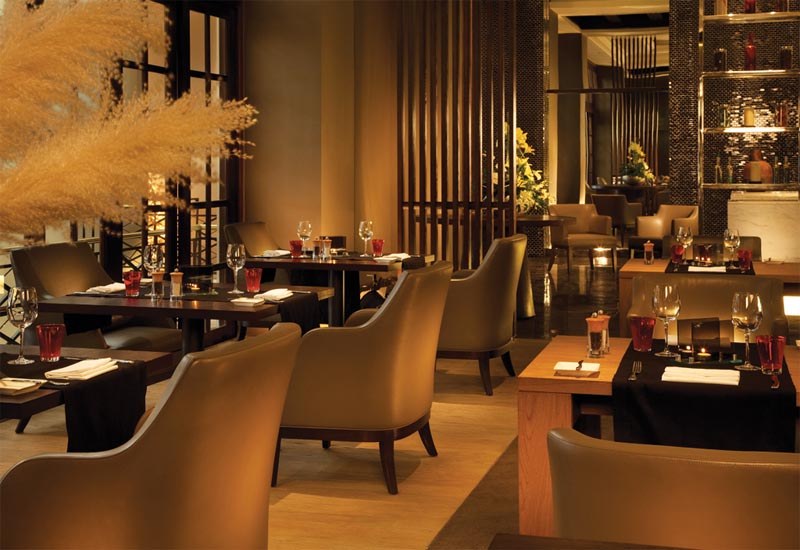 Oak Grill at the Conrad in Cairo. The group says now is the time to refurbish many of the properties in the city due to lower footfalls.
Oak Grill at the Conrad in Cairo. The group says now is the time to refurbish many of the properties in the city due to lower footfalls.
Is there a move towards more branded restaurants within hotels?
SL: The industry in general is moving towards branded-, known concepts — it’s a trend in that direction. We’ve been doing that for many years. This restaurant is a prime example of a franchise partnership which works amazingly well.
JMD: The UAE in particular is very brand centric. Brands work here. There are other areas that wouldn’t support a franchise brand, but I think the UAE is a few steps ahead. It’s almost like Las Vegas in terms of the brand offerings with its combination of celebrity chefs and the known outlets.
Is Hilton looking to do more celebrity tie-ups with its restaurants?
SL: We had a fantastic partnership with Gordon Ramsay at Hilton Dubai Creek, but [when that ended] we formed a great partnership with the local chefs that were already at the restaurant (now called Table 9) — Nick Alvis and Scott Price.

| Advertisement |
Knud Bundgaard: The trend is going towards homegrown local celebrity chefs so when people go to Table 9 they know that the celebrity chef is actually cooking — that’s what’s changed in the last couple of years. People want to know that the food is being cooked by the chef who’s got their name on the restaurant.
How has the performance of Table 9 changed since the contract with Gordon Ramsay ended?
KB: From a food perspective I really do not believe you could get a better meal in Dubai. The food is very creative and it is not handed over as a recipe [from an absent celebrity chef], it’s cooked by the people with the skills.
SL: The volumes are definitely up year round — that’s no question. We took a bit of a different strategy where we lowered the price points slightly and offered a range of value to the guest and that’s proven to work — so far so good. We know it’s going to perform.
Which has the highest revenue potential in your opinion - franchise or homegrown concepts?
SL: They [the franchiser] will take a percentage of revenue, but you’ll find that known brands generate more volume [than a home-grown concept]. So in 80-90% of cases you see more revenues if the restaurants are franchised. The price points vary wildly, but in general terms you see a higher footfall providing you have the right partner.
Hilton has launched the website Hiltonrestaurantconcepts.com inviting outlet concepts ideas from restaurateurs — how does the website work?
JMD: You have two different platforms; one is specifically designed for the Hilton culinary teams — the hotel owners, franchisees as well as general managers of hotels. They then have the ability to communicate specific requirements such as menu frames, pricing points and design elements.
The website will try to match these requirements with a choice of concepts, including branded partnerships taking into account what we’ve got across the network already, looking at a range of great concepts that suit the needs of operators and owners and offer valuable experiences for local guests.
So are there new concepts that are being pitched to Hilton through the website by restaurateurs?
JMD: Yes, we’ve got Ruth’s Chris Steakhouse — that’s one of them. We are trying to develop partnerships as we go along. It’s a good way for franchisers to promote and affiliate themselves with the Hilton brands.
How many new brand partnerships do you expect will arise from the new concept website?
JMD: It’s difficult to say at the moment, but we’re obviously looking at a variety of complementary brands that suit the local market and each property.
What are emerging as the most popular restaurant concepts in the region?
JMD: Because of the economic challenges and the fact that people are trying to find reassurance in food concepts, the sharing concept is very popular. It brings a familiar feeling where everyone’s united around the table eating simple food.
People are much more knowledgeable about what they want and they’re price conscious. They’re demanding respect, but we’re trying to get away from a sense of formality.
In the UAE, particularly in Dubai, the market is getting very mature in terms of the restaurant experience — not just the food but the service, the design and all the different elements that create it.
People are looking for a restaurant experience where a manager can take full ownership, the staff can recognise you, make you feel welcome and offer you food that is identifiable, simple and good value for money.








 Search our database of more than 2,700 industry companies
Search our database of more than 2,700 industry companies









